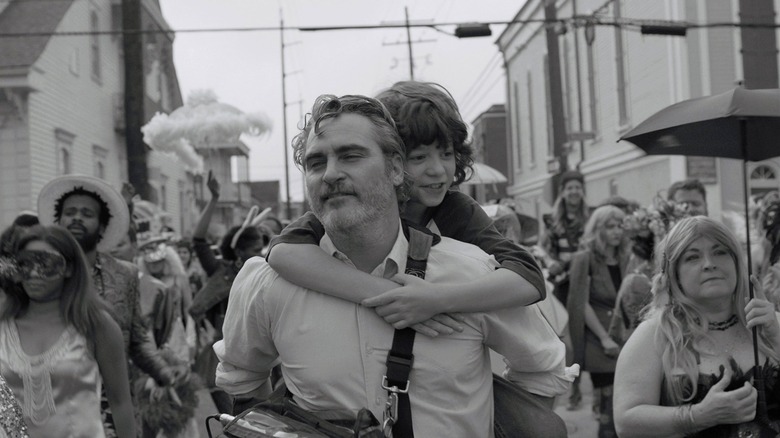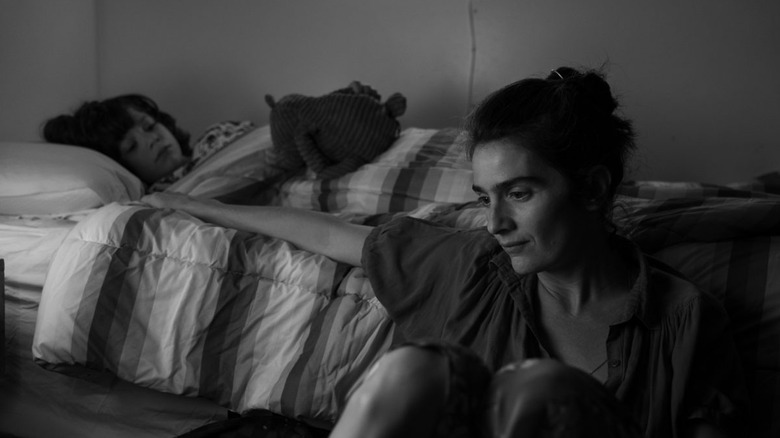C'mon C'mon Review: Joaquin Phoenix Is A Natural In Mike Mills' Gentle Family Drama
"What makes you happy?"
That's one of the questions that Joaquin Phoenix's Johnny, an emotionally closed-off radio journalist, blithely asks children in cities across the country at the beginning of Mike Mills' lovingly naturalistic black and white film, "C'mon, C'mon." He's working on a piece about the next generation, how they see themselves and how they see the world, in all its bright, sunny streets and its sad, shadowy corners. They ramble and punctuate their sentences with "likes" and "ums" like children do, lending a documentary-style feeling to the film and a pleasant, chattering background noise to Johnny's quiet life, as the he listens alone to the wise nuggets from the mouths of babes with a slight crooked smile.
But happy might not be the best word to describe Johnny's existence, even if at first he seems perfectly content. He's a successful radio journalist, he gets to travel across the country for work, he gets to witness these stories and lives that are made so interesting by his microphone. However, as this ambling family drama unfolds, the unpleasant parts of Johnny's life reveal themselves — he's been estranged from his sister Viv (Gaby Hoffmann, resilient and wounded) a year after their mother's death, and he's not gotten over a long-term relationship with a woman we never see except for the emotional scars she's left.
But the former issue may not last for much longer, as Johnny one day receives a call from his sister, who is overjoyed at having heard his voice on the radio. She recognized him and pointed it out to her young son, Jesse (a revelatory Woody Norman), though it had been so long since he'd seen them that Jesse had no idea who she was talking about. As Viv catches Johnny up on her life, she casually mentions that she has to leave for the weekend, she just needs to find someone to watch Jesse. Johnny, seeing the chance to see his nephew for the first time in years, offers to watch him for the weekend.
Not So Black-and-White
Mills chooses not to unveil these scenes one at a time, but rather in an overlapping tapestry of sights and sounds, past and present. As Johnny and Viv chat on the phone, their vague allusions to the past become blisteringly real, Mills cutting to their raw screaming matches and slammed doors, playing out silently as they awkwardly make small talk. When Viv cheerily mentions her weekend trip, there are scenes of her happily playing with Jesse intercut with shots of her mournfully pondering something alone. That "C'mon C'mon" is shot in a stark black and white color scheme does not make it feel any less full — on the contrary, it feels like a deliberate choice to balance out the auditory and visual noise of Mills' collage-like approach.
The director of such films as rich ensemble films as "20th Century Women" and "Beginners," Mills' straightforward character-heavy approach has always allowed him to explore the full range of complexity within everyday troubles and sadness. That's never more prominent than in "C'mon C'mon," in which Mills peels back the artifice of filmmaking to create something that sits somewhere between docudrama and ASMR video. As for the black-and-white of it all? It lends it a timelessness of sorts to the film, even if it can't escape the feeling of pretension.
'Make This Mundane Thing Immortal'
But there's little pretentious about "C'mon C'mon." Rather, it's amazing in how very ordinary it is. In Mills' typically unflashy fashion, the plot is fairly straightforward: Johnny finds himself looking after his nephew Jesse, taking him along on his cross-country trips for work and growing a unique and deep connection with him. It's fitting that Johnny is a radio journalist who is dedicated to elevating the everyday into something special — that is what "C'mon C'mon" does as well. "You make this mundane thing be immortal!" Johnny exclaims to Jesse, after finding that Jesse has a knack for recording audio with his equipment. Bryce Dessner and Aaron Dessner's classic score — a twinkling piano most times, swelling up to a full orchestra only in key emotional moments — interweaves with the diegetic sounds of children chattering, beach waves, and city sounds to create one seamless soundtrack, bridging together the artifice of film with the ordinariness of reality.
It's this gentle, organic approach that makes the more sentimental moments of "C'mon C'mon" play so sharply. There is nothing quite that out of the normal with Viv's family a first — sure, her son Jesse likes to wake up at the crack of dawn on Saturday to blast opera, but that's just a little quirk. So is his tendency to pretend to be an orphan who's arrived to replace the dead children of his mom — a strange nighttime ritual that Viv indulges but Johnny raises his eyebrows at. But Johnny quickly develops a fondness for Jesse and invites him to stay with him in New York when Viv's weekend trip suddenly extends to several weeks. Viv reveals to Johnny that she's attempting to help her bipolar husband, who is suffering a breakdown. Johnny is sympathetic, even as we see through that overlay of flashbacks that he wasn't quite so understanding in the past, and offers to take Jesse indefinitely to help out.
Joaquin Phoenix Gets Down to Earth
Joaquin Phoenix proves himself to once again be one of today's best working actors, delivering a warm, grounded, unshowy performance as Johnny, a long-single man who suddenly finds himself forced to become a father figure to a boy he barely knows. Phoenix enjoys a strange kind of stardom — instantly recognizable, immediately charismatic, but fully chameleonic in each of his roles. But for some reason, this quietly ordinary performance stunned me again, perhaps because Phoenix doesn't so much as disappear into the role as he does inhabit it. And the dynamic he strikes up with newcomer Woody Norman is the big beating heart of this film.
Norman is a discovery. He's neither too self-conscious nor too wooden as most child actors usually are, Norman fits in perfectly with Mills' naturalistic drama — almost too realistically bratty and probing sometimes — but with just a shade of melancholy. As written by Mills, he's sometimes falls into the trappings of Precocious Child (do children speak like that?) but it's easy to forgive. Phoenix plays the uncertain babysitter-turned-father-figure to Jesse perfectly, stumbling through parenting obstacles and panicking when Jesse's mercurial mood takes a turn for the worse. It might be easy to write the film off as "man in arrested development looks after child, but learns even more" but "C'mon C'mon," despite its straightforward approach, is not so simple.
There's something about a Mike Mills film that feels like it's gently caressing the hair out of your face and kissing you on the forehead: a softness, a wistfulness that acknowledges how hard reality can be while tucking you into bed. While "C'mon C'mon" can't protect you from the world, it can at the very least hold your hand as it tries to figure out the path forward too.
/Film Rating: 8.5 out of 10



